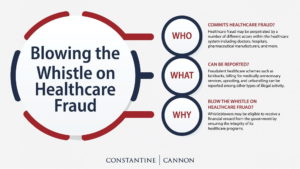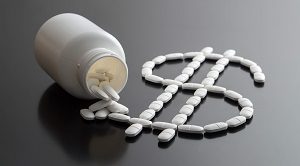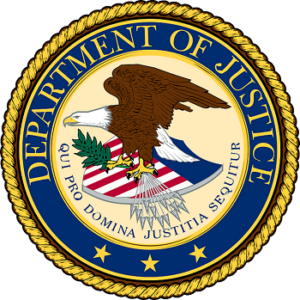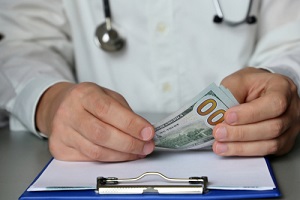Healthcare & Pharmaceutical Fraud
What potential whistleblowers need to know about reporting fraud in the healthcare industry
Fraud in the healthcare, pharmaceutical, and durable medical equipment industries is significant and contributes substantially to rising healthcare costs.
And sadly, it can be pervasive during a national or worldwide health crisis.
The federal and state governments collectively spend hundreds of billions of dollars every year on healthcare programs including Medicare and Medicaid.
Whistleblowers play a critical role in stopping healthcare fraud

Experts estimate that up to 10% of all healthcare spending results from false claims. That amounts to tens of billions of dollars a year in fraudulent billings to Medicare and other government healthcare programs.
Whistleblowers who report healthcare fraud by bringing a case under the federal False Claims Act or a state False Claims Act may be eligible to receive a share of the government’s recovery as a financial reward.
The whistleblower rewards of the False Claims Acts recognize the significant role whistleblowers can play in saving money for U.S. taxpayers and ensuring the integrity of government healthcare programs.
Topics Covered Here:
- Managed care organizations
- Hospitals
- Providers
- Pharmaceutical organizations
- Medical device and durable medical equipment (DME) manufacturers and distributors
- Home health and hospice organizations and providers
- Skilled Nursing Facilities (SNF)
- Laboratories and diagnostic testing facilities
- Chiropractors
What activities can be reported?
- Violation of laws prohibiting kickbacks and certain financial arrangements
- Upcoding
- Risk adjustment fraud
- Unbundling
- Billing for services not provided
- Billing for services that are not medically necessary
- Billing for unlicensed personnel
- Billing for unauthorized locations
- Electronic health record (EHR) fraud
- Off-label marketing of prescription drugs
- Defective products and manufacturing violations
- Discount/rebate and other pricing fraud
- Clinical trial/FDA fraud
- Compounding pharmacy fraud
Who commits healthcare fraud?
Healthcare fraud that could give rise to a whistleblower claim may be perpetrated by a variety of actors throughout the healthcare system, including providers (doctors and clinics), hospitals, pharmaceutical manufacturers and pharmacies, labs, managed care organizations, and others. These include:
Managed care organizations
Managed care organizations collaborate with insurers to offer Medicare Advantage plans and Medicaid Managed Care plans, which incentivize care to help prevent serious illness or injury. Fraudulent activities include unfairly selecting healthy patients over those with preexisting conditions (including pregnancy), falsely reporting the health status of beneficiaries (risk adjustment fraud), overspending on administrative expenses, or falsifying reimbursement documents.
Hospitals
Hospitals may bill for services not provided, bill for unnecessary procedures, violate kickback laws, admit patients who could be treated on an outpatient basis, and engage in other wrongful behavior.
Providers
Physicians, therapists, clinics, and surgical centers may bill for services not provided or not medically necessary, or “upcode” lower-cost procedures for those of higher cost, among other fraudulent schemes. Providers are also subject to the Anti-Kickback Statute and Stark Law.
Pharmaceutical organizations
Pharmaceutical manufacturers and distributors, pharmacies, and pharmacy benefit managers (PBMs), engage in fraud through off-label marketing, manipulation of clinical trials, or other violations. Pharmacies may bill for drugs not provided, over-bill, divert drugs for illegitimate purposes, or falsify prescriptions.
Medical device and durable medical equipment (DME) manufacturers and distributors
DME-related fraud can occur with everything from bedpans to x-ray machines. Fraudulent behavior includes kickbacks from suppliers, off-label marketing, charging for unnecessary or defective equipment, and other practices.
Home health and hospice organizations and providers
Home healthcare and hospice services are noted for their high rate of fraudulent healthcare claims, such as billing for services that were not needed, not provided, or not ordered by a doctor, falsification of forms, and other actions.
Skilled Nursing Facilities (SNF)
These facilities provide care for individuals who need close attention but do not require a hospital stay. Fraudulent activities may include overbilling, kickback violations, and billing for services not medically necessary.
Laboratories and diagnostic testing facilities
Labs and testing facilities get only the work that is referred to them, so fraudulent activity usually relates to artificially increasing this work through kickback violations, overbilling, and billing for tests that were unneeded or unrequested by a physician.
Chiropractors
Common fraud by chiropractors includes charges for treatments that were unnecessary or never provided, or billing for services not covered by Medicare.
What activities can be reported?
Participants in the healthcare system are required to follow the laws and regulations of that system. When they knowingly fail to follow those rules, they cheat the system. Common fraudulent schemes and types of fraud on government healthcare programs include:
Violation of laws prohibiting kickbacks and certain financial arrangements
The Anti-Kickback Statute and Stark Laws prohibit payments and financial arrangements that pose a risk for medical treatment decisions being influenced by potential monetary gain for the provider instead of the well-being of the patient.
Upcoding
Upcoding involves exaggerating the time, procedure, or staff involved in treatment in order to bill for more services or to bill at a higher rate.
Risk adjustment fraud
“Risk adjustment” payments are made to promote provider support for people with costly diseases. Risk adjustment fraud examples include falsifying claims, exaggerating the severity of a patient’s condition, retesting despite past diagnoses, inferring diagnoses from insufficient data, and other practices.
Unbundling
Unbundling involves billing a single service as if it were multiple services. This activity becomes fraudulent when the sum of reimbursements for these numerous sub-services is higher than the single service.
Billing for services not provided
It is a violation of the False Claims Act to bill for services that were not actually performed, or to charge for supplies and equipment that were never delivered.
Billing for services that are not medically necessary
Medically unnecessary services may include unnecessary inpatient admissions, advanced imaging, unnecessary tests or lab work, and other procedures.
Billing for unlicensed personnel
This may include services provided by individuals who lack the skills or proper licenses, or services provided by trainees without the required supervision.
Billing for unauthorized locations
This may include services performed at a facility that is inappropriate for that service, or a facility that is improperly staffed or equipped for the procedure.
Electronic health record (EHR) fraud
Companies that develop and sell electronic health records systems and services may face liability for creating systems that fail to meet government certification standards. In addition, providers and hospitals may face liability for fraudulently claiming EHR incentive payments, or for submitting fraudulent bills based on EHR systems designed to improperly increase reimbursements. EHR marketing may also implicate unlawful kickbacks and other improper financial relationships.
Off-label marketing of prescription drugs
“Off-label marketing” means that a drug is promoted for a use that was not approved by the FDA, such as marketing a drug designed for adults to be used by children. Another example is recommending a higher dosage than is approved.
Defective products and manufacturing violations
This type of healthcare fraud involves manufacturers releasing product for public use and consumption that the manufacturer knows or suspects is damaged or contaminated in some way.
Discount/rebate and other pricing fraud
Government healthcare programs pay for pharmaceuticals and devices at specified rates, often tied to specified cost metrics. Misuse or manipulation of these programs can result in the submission of false claims.
Clinical trial/FDA fraud
The FDA relies on trial data to verify the safety and efficacy of drugs. If any party in the trial process misrepresents, omits, or falsifies the data, such FDA fraud can create far-reaching damage to future users of the drug.
Compounding pharmacy fraud
This fraud involves pharmacists mixing drugs or making large batches, rather than following strict procedures to meet the needs of individual patients.
Contact a Whistleblower Lawyer to Report Healthcare Fraud
We can’t list every way that people have tried to cheat the healthcare system, and people are always finding new ways. Whistleblowers play a critical role in maintaining the integrity of the system, protecting patients, and saving taxpayer money. If you would like more information, or would like to speak to a member of the Constantine Cannon’s healthcare whistleblower lawyer team, please Contact us for a Confidential Consultation.




